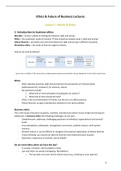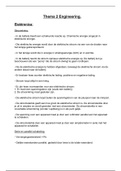Samenvatting
Ethics and the Future of Business summary/notes of lectures 1-4
- Instelling
- Universiteit Van Amsterdam (UvA)
- Boek
- Business Ethics
A summary and notes of lecture 1, 2, 3 and 4 of the general part of the course Ethics and the Future of Business. Got a 9.4 (out of 10.0) on the exam for Ethics and the Future of Business with this summary.
[Meer zien]






